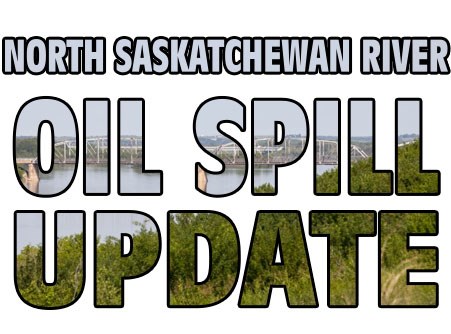The Saskatchewan Environmental Society has called for some big changes and new regulations in the wake of this summer’s Husky oil spill.
They released details of their proposals last Friday, which are being submitted in letters to the ministries of the Environment, the Economy and Natural Resources. They call for major changes in the way pipelines are built and regulated.
One change they call for is a mandatory environmental impact assessment for any proposed oil pipeline project crossing an important river, lake or wetland.
“That was not required for the Husky Energy gathering line where the spill occurred,” said SES president Bert Weichel in a news release. “Nor was it required for the expansion to the Husky Energy oil pipeline system that was built across the North Saskatchewan River last year.”
SES also called for inspection and emergency response protocols to be upgraded. While they were happy to see that flow lines were going to be licensed in an announcement made by the province last week, SES called for all oil pipelines to be regularly inspected by the provincial government and for those to be carried out by the Ministry of Environment, not the Ministry of Economy.
The society also called for better preparation to respond to a spill. SES urged the province and Husky Energy to upgrade emergency readiness for oil spills and to have a plan to ensure the response equipment will be available and on the water within a matter of hours.
The society also called for all oil pipelines intersecting with water bodies to be equipped with the latest spill technology, as well as automatic shutoff valves that respond quickly to pressure anomalies.
Peter Prebble, SES board member and their lead researcher on the Husky Energy oil spill, called for pipeline specifications to require to be built with extra heavy walled pipe along sections of the route where a spill could have serious consequences, such as riverbanks, river crossings, major lakes and protected areas.
SES also called for the province to impose fines under the Pipelines Act and the Environmental Management and Protection Act against Husky Energy for polluting the North Saskatchewan River and endangering an important drinking water resource.
Prebble added that Husky should also be required to upgrade the safety features on its pipelines at river and lake crossings in the province. “This broader corrective action is precisely what was required of Enbridge following its oil pipeline spill in Michigan in 2010,” Prebble said. “Husky Energy should be held to a similar standard.”
Prebble also raised concerns about the number of unanswered questions still lingering about the spill.
“Examples of those questions include why Husky Energy changed its account of when the oil spill was first discovered and reported, why the initial response to the spill from Husky and the provincial government was so slow, how much oil actually spilled and what steps Husky Energy was taking to monitor the stability of the slope along the North Saskatchewan River prior to the pipeline rupture occurring,” he stated, referring to the prevalence of ground movement in the general area of the pipeline.
Prebble and Weichel expressed dissatisfaction with Husky Energy’s spill report to the province on Nov. 17. They called on the government to initiate an independent third-party investigation into the spill.
Their recommendations were released just days after Environment Minister Dustin Duncan announced changes to the Pipelines Act last week. According to a government release Nov. 28, those included creating a legal framework for phased-in licensing of more than 80,000 flow lines which are currently exempt, building an online pipeline licensing system, establishing new inspection, investigation and compliance audit powers for ministry staff, updating and modernizing penalty provisions and some licensing and construction improvements.
But the SES representatives said that is not enough and more was needed.
“We welcome the amendments to the Pipelines Act announced by the provincial government on Nov. 28, but much more substantial change is required if we are going to ensure the safety of oil pipelines and the protection of drinking water supplies in Saskatchewan,” said Weichel.




